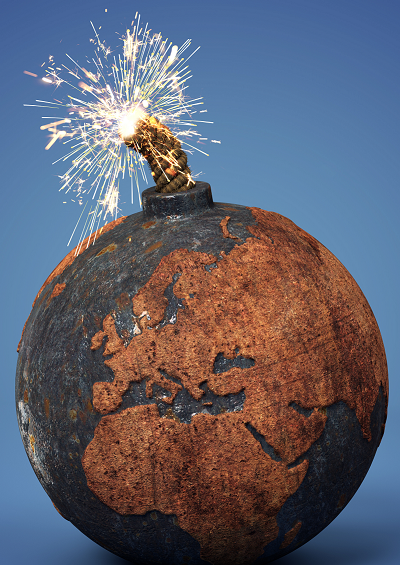Is Democracy in Decline Globally?
Corruption and debt darken the global outlook for democracy.

Credit: Dzianis - Shutterstock.com
Takeaways
- According to the Corruption Transparency Index, government corruption is perceived to be high in more than two-thirds of the 180 countries surveyed.
- That the Economist Intelligence Unit (EIU) has demoted the US from “full democracy” to “flawed democracy” should escape nobody’s attention.
- Beyond the US, 2020 was a terrible year for democracy across the globe.
- Approximately 85% of all foreign debt held by 120 middle and low-income countries is on non-concessional terms.
- The big hope for 2021 is that leading Western industrial countries will overcome the pandemic and that this may set off a boom start in their economies.
The fact that the Economist Intelligence Unit (EIU) underscores that the United States is a “flawed democracy” and far behind its northern neighbor Canada — a “full democracy” — in its new annual Democracy Index should escape nobody’s attention.
It is a sad testimony to the parlous state of democracy in today’s world — and the true legacy of Donald Trump’s stint in the White House.
2020 was a terrible year
Beyond the United States, 2020 was terrible for democracy across the globe. Many governments dispensed with parliamentary oversight and checks and balances, canceled or postponed elections, prohibited public protests, curtailed freedom of expression and perpetrated healthcare fraud and corruption.
The overall state of global democracy took a dive in part because democracy in Hong Kong got hammered by China.
It suffered badly in Mali, leading to a military coup — due in part to terrorist insurgents — and, on a regional basis, trends across the Middle East and North Africa — as well as Latin America — were depressing.
According to the EIU, the list “may sound dystopian, yet this was the experience of most people in 2020.” I believe 2021 may be worse.
Corruption pervades
For some years, the EIU’s survey has been painting a picture of democracy in retreat. Now, in part due to the COVID 19 pandemic, authoritarianism is gaining.
The depressing finding is reinforced by the newly published Corruption Transparency Index (CPI), issued annually by Transparency International (TI). It shows that government corruption is perceived to be high in more than two-thirds of the 180 countries surveyed.
Financial turmoil
The big hope for 2021 is that leading Western industrial countries will overcome the pandemic, with at least a great majority of their populations vaccinated, and that this may set off a boom start in their economies.
The global impact of such a development, so the hope goes, would lift all boats and pull the poorest countries out of the rough seas that engulf them.
Poor governance stands in the way
And yet, the continuing reality of poor governance including corruption — along with increasing authoritarianism — may counter the positive impact of a revival of Western economies.
The critical issue, as I have warned before, is that many of these countries are over-burdened with debt.
On the domestic front, some of these countries are just broke — mainly thanks to pervasive corruption. Lebanon is one current example, South Africa is another.
In January, amid calls for far greater spending to counter the pandemic, South Africa’s President Cyril Ramaphosa confessed: “We do not have the money . . . that’s the simple truth.”
“High risk”
Domestic debt crises are compounded by the rising challenge that many countries have in servicing their foreign debts. A decade ago, many developing countries were encouraged by private investment managers to use the private markets to borrow — and they did.
Meanwhile, approximately 85% of all foreign debt held by 120 middle- and low-income countries today is on non-concessional terms. It is owed to hedge funds, pension funds and other private investors.
A new report by World Bank economists Peter Nagle and Naotaka Sugawara concludes: “More debt defaults and debt distress are possible.”
I think that is an understatement — more countries will default. Their debts are unsustainable. They will follow Lebanon, Argentina, Zambia and others into debt restructuring negotiations with their private creditors.
The two economists provide a new chart that shows that more than 40% of the countries are now viewed as being in the “high risk” category.
IMF bailouts
The prospect of the world’s worst sovereign debt crisis is leading G7 finance ministers to start developing plans for a large boost to the resources of the International Monetary Fund (IMF). The Biden administration, unlike the Trump team, supports this.
The plans, likely to be finalized by the summer, may see the IMF striving to bail out many of the debt-distressed countries and help them to restructure their private debts, but this just adds debt upon debt while aiding the private creditors.
Conclusion
The solution, which may also include further postponement by official creditors of debt repayments to them from the poorest nations, may stave off a global financial crisis.
But it will do very little for the poorest people in the debt-defaulting, high-risk, non-democratic countries.
Equally bad, such solutions do nothing to counter the grand corruption that pervades so many countries and that is adding gravely today to poverty — while sustaining the decline of democracy across the world.
One piece of good news: The EIU reported that improvements in transparency in government and elections in Albania enabled this country to move up in 2020 from a “hybrid” country close to authoritarianism to the “flawed democracy” group — thus joining the United States.




























